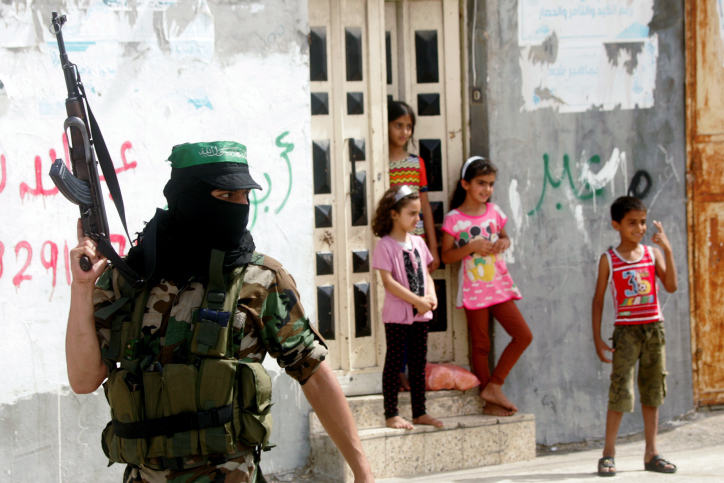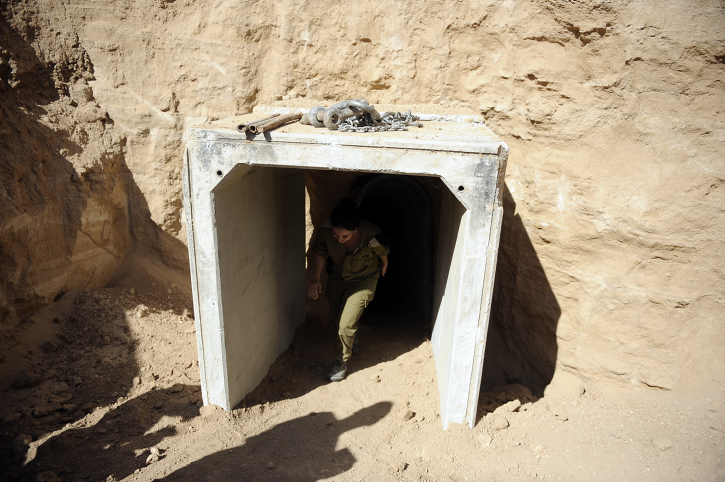Israel’s present course of action against Hamas is befuddling friend and foe alike. It’s also working.
For all their bombastic rhetoric over the past few days, Hamas greatly fears an Israeli ground incursion into Gaza • While Hamas has not achieved anything significant and is quickly running out of resources, Israel has created an unprecedented base of legitimacy allowing for low-level military activity over an extended period • Without a responsible adult in Gaza, it appears a cease-fire will only happen under heavy military and internal Palestinian pressure A situation assessment

Prepared by: Eric Greenstein
Israel knows where many of the terrorists are hiding, from the senior commanders all the way down, ‘Mida’ has learned. From a qualified source we’ve learned that terrorists are based in residential buildings, some of them multi-storied ones, which are filled with civilians and spread throughout the Gaza strip – in Gaza City, Beit Lahiya and to the south as well. The only reason the IDF is not using the air force or another method of firepower to take them out is due to a “moral-humanitarian operational problem”.
The location of these terrorists in crowded buildings shows that a “ground incursion” is not a panacea to the present conflict. An infantry or armored force has no particular advantage over air power when dealing with terrorists hiding behind frightened civilians. If the government takes a hard decision, such as the killing of Salah Shehadeh in 2002 which also killed 14 civilians, the Air Force can do this much easier than a ground force engaging in a house-by-house fight on the ground.
On the other hand, a limited incursion close to the border, aiming to destroy some of the tunnels, is certainly possible and would involve a manageable amount of Clausewitzian “friction”. There may in fact be no alternative, since the air force’s ability to hit some of the tunnels is limited.
In the event Israel decides to deepen the damage done to Hamas, the IDF has a great deal of intel on the tunnels, and this intel would allow them to damage or destroy many of them. There would be no need to expose ground troops to go in and interrogate terrorists regarding the location of tunnels. However, some tunnels will likely be missed, as the technology to discover them all does not exist yet, unfortunately.
Hamas is Failing to Achieve Anything Significant
At the start of the Operation, the IDF uncovered and destroyed a tunnel meant to allow a show terrorist attack in Israeli territory. Hamas were placed on a high state of readiness to move a large number of forces into Israel through this tunnel, with the aim of kidnapping hostages and committing mass murder. The prevention of the attack, meant to strike a major blow and create an impression in the world media, is a clear failure of Hamas in the campaign.
The IDF estimates that Hamas’ rocket fire for the past week and a half is another failure of the terrorist organization. If there is any surprise in Gaza, it’s that neither Hamas nor Palestinian Islamic Jihad expected their fire to be so useless and cause so few casualties. They expected that Israel would have dozens of dead and wounded after having fired over a thousand rockets and missiles.
Furthermore, from an arsenal of 9,000 rockets at the start of hostilities, the terror organizations are down to about half that. Most have been destroyed by Israeli forces, the rest fell or were shot down on Israeli territory. The operation of the Israeli navy SEALS continues to raise questions. The missions were accomplished and the launchers were destroyed. Nevertheless, the IDF is conducting an inquiry on the matter and we’ll likely see an official announcement on the matter in a few days.
There is hardly an Israeli who has not encountered the bravado of Hamas members all over the news media and the internet, practically daring the IDF to launch a broad ground invasion. Their intent, apparently, is to kill soldiers through booby-traps and prepared ambushes. Israeli officials see this as nothing but empty rhetoric, and that in practice they’re quite afraid of a ground attack.

Which leaves us with the question: why is Israel so afraid of one? There are those who claim this is due to a fear of casualties, but that is false. The correct answer is that Israel presently enjoys an unprecedented base of legitimacy internally and internationally. It has no interest in creating global drama by actually invading in force.
Such an action, no matter how successful, would create a crisis, the extraction from which would force Israel to make concessions – including political ones. Meanwhile, Israel can continue what it’s doing now and slowly eliminate Hamas while the diplomatic world is largely silent on the matter. The IDF’s target bank continues to accumulate and the ability of the IDF to continue to hurt Hamas has not diminished.
The steady erosion of Hamas’ power during Protective has put it under serious pressure. All throughout hostilities it has not succeeded in bringing in a single major political player on its side, certainly not in the international arena. Meanwhile, Israel has Egypt, the Arab League who proposed a case-fire in the middle of the week. The United States, Germany, France and Britain are firmly on the Israeli side. Hamas is even losing Gazan public opinion, which is constantly pressuring for a cease fire from a fight causing them unnecessary damage and loss of life for no perceivable gain.
Hamas has greatly angered Egypt, and for Israel this is a major factor and yet another reason to go all in with a ground invasion. President al-Sisi is afraid that at any moment the Egyptian public, which is essentially pro-Palestinian, will spill out into the streets in protest. Such an event is undesirable both to al-Sisi and Israel. As long as Israel continues to fight “under the radar” and at a low level, we have unlimited time to continue to destroy Hamas.
Only Pressure Will Help
None of this is to say we know when Hamas will sue for a cease fire. One point might be when Hamas’ “military” activity brings enough economic benefit to allow it to do so. According to Israeli officials, this and the question of it suffering more loss and “wastage” than the dwindling rocket supply justifies are two points which might predict when Hamas will stop firing.
The IDF defines the Hamas achievement as one of image, not of concrete strategic gains. If we ignore the profligate demands recently raised by a senior Hamas official, their basic demands are not extreme – they are willing to return to the Pillar of Defense understandings, which held until half a year ago. Hamas also wants some symbolic act that will demonstrate the easing of the blockade against them.
But Israel questions whether Hams can conduct the kind of cold internal discussion based on gains and losses that would lead them to this kind of compromise. Without such a discussion, it seems only military pressure, along with internal Palestinian opposition, will help. They might even accept the recently Egyptian-proposed cease fire, which they saw as humiliating. We must never forget, also, Palestinian Islamic Jihad, which is economically and operationally dependent on Iran.
The main outcome of a cease fire will be the strengthening of the Egypt-Israel ties, with al-Sisi positioning himself as the one who brought peace and quiet to the Palestinians. How this will happen is still up in the air, much like the masses of rockets still being fired.
English translation by Avi Woolf.
To receive updates on new articles in English, join Mida on Facebook or Twitter or join our mailing list.



